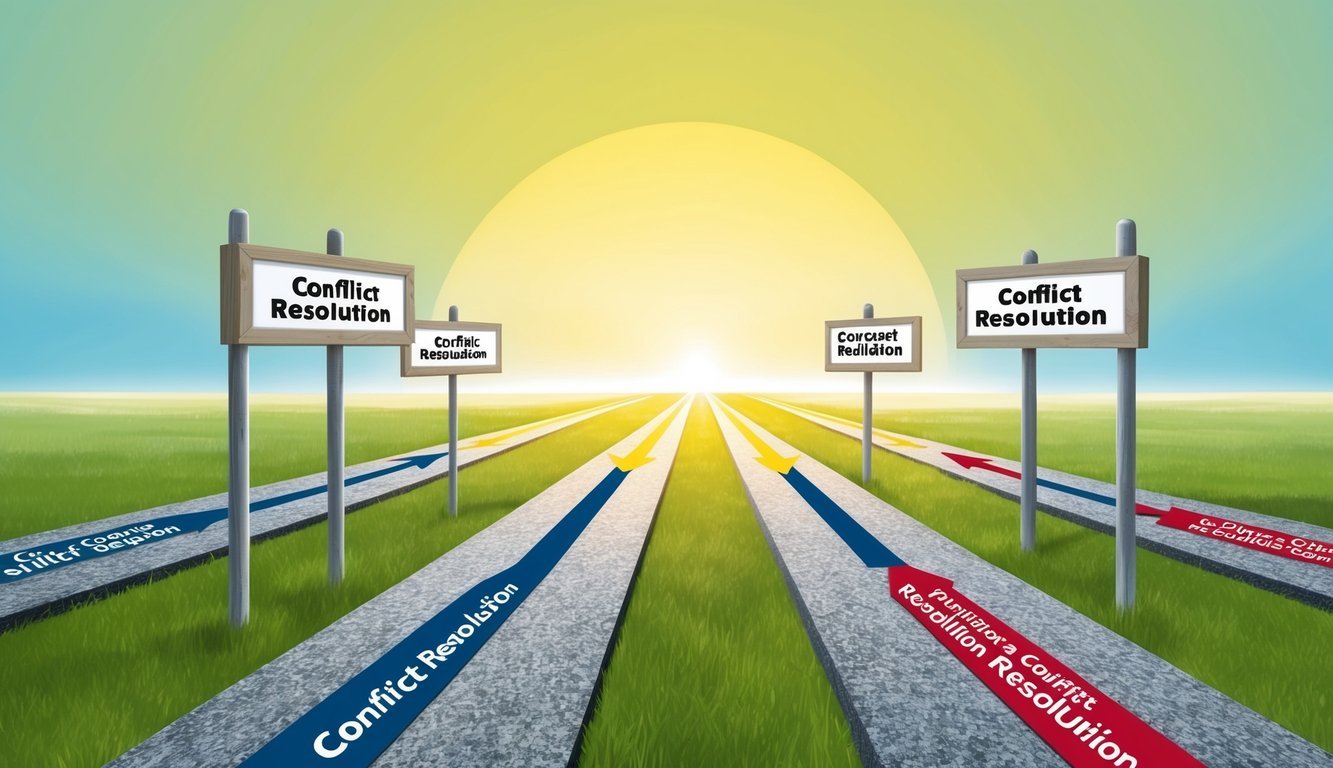“`xml
Conflict is one of those things we can’t escape—whether at work or at home, disagreements pop up all the time.
But here’s the good news: learning how to manage these situations can profoundly impact your day-to-day life.

Conflict resolution courses are like a toolkit for your life.
You’ll pick up essential skills—think better communication, discovering common ground, and problem-solving techniques.
Trust me, these classes can come in handy everywhere!
Let’s take a look at some of the best options out there to boost your conflict management skills, shall we?
1) “Conflict Management for Leaders” by Berkeley Executive Education
If you’re eager to up your game when handling workplace disputes, check out the Conflict Management for Leaders course.
It’s a fantastic pick for managers seeking to resolve tensions and keep the peace.
This program spills the beans on managing team conflicts.
You’ll learn some nifty tricks for maintaining harmony and productivity.
Ever wondered why some disagreements escalate while others get resolved quickly? This course breaks it down for you! You’ll get the lowdown on the psychology behind conflicts—spoiler: it’s pretty fascinating.
But it doesn’t stop at just understanding the struggles.
You’ll also learn proactive strategies to prevent conflicts from bubbling up in the first place.
Think of it as your secret weapon for a peaceful workplace.
And the best part? It’s not all about lectures; you get to put your learning into practice too.
Role-playing and real-life scenarios help solidify those skills.
By the end, you’ll be turning stormy situations into growth opportunities, which your team will definitely appreciate!
2) “Constructive Conflict Resolution” by University of California, Irvine
Want to tackle conflicts like a champ? Take a look at the Constructive Conflict Resolution course from the University of California, Irvine.
This course teaches you effective ways to turn arguments into constructive conversations.
You’ll master how to stay calm and communicate, even when things get heated.
You’ll explore various types of conflicts and learn how to identify them early on.
Plus, you’ll practice techniques to de-escalate tension and find solutions that everyone can agree on.
One of the highlights? This class involves role-playing real-life scenarios, giving you a hands-on experience that makes learning stick.
The course also dives into the psychology of conflict, helping you understand how personality clashes and social factors contribute to disagreements.
Armed with this knowledge, you’ll navigate tricky situations like a pro.
When you finish, you’ll have a toolkit of strategies ready to tackle conflicts—at work, home, or anywhere else.
It’s a fantastic way to sharpen your people skills and become the peacemaker in your circle.
3) “Mediation and Conflict Resolution Specialization” by the University of London

Looking to sharpen your conflict resolution skills? Check out the Mediation and Conflict Resolution Specialization from ESSEC Business School.
It’s especially useful for managers wanting to elevate their negotiation game.
You’ll learn proven strategies for effective negotiations, covering everything from workplace disputes to international conflicts.
This isn’t just theory—it’s practical stuff you can apply right away!
The specialization includes several courses, starting with the fundamentals of negotiation and advancing to more intricate mediation topics.
By the end, you’ll confidently direct mediation processes and tackle challenging situations, both in work and global contexts.
And the icing on the cake? You’ll get to put your skills to the test in a final project, applying everything you’ve learned to real-world cases.
It’s a great way to solidify your learning and build confidence.
4) “Leading with Emotional Intelligence: Managing Conflict” by Case Western Reserve University

Want to boost your conflict management skills? Check out the “Leading with Emotional Intelligence: Managing Conflict” course by Case Western Reserve University on Coursera.
This course helps you harness emotional intelligence to handle workplace conflicts.
You’ll learn to identify various types of conflicts and discover effective ways to manage them.
You’ll dive into essential skills like active listening and empathy, helping you grasp others’ perspectives and find collaborative solutions.
And, you’ll practice using “I” statements to express yourself without finger-pointing—making tough conversations feel much smoother.
The course also teaches you techniques to stay calm during heated moments, helping you manage your own emotions while guiding others through theirs.
By the time you wrap up, you’ll have practical tools to turn potential conflicts into opportunities for growth, making your workplace a better place to be.
Understanding Conflict Resolution
Conflict resolution skillfully navigates disagreements, utilizing skills like active listening and problem-solving to find solutions for everyone involved.
Core Concepts
Conflict resolution boils down to effective communication.
Listening is key! Start by paying close attention to what others are saying and try to see things from their point of view.
Staying calm during a disagreement is crucial.
If you’re feeling angry or overwhelmed, take a deep breath; it’ll help you think more clearly.
Look for commonalities—even if you don’t see eye to eye on everything, there might be points of agreement you can build on.
This is a great launching pad for finding a resolution.
Importance in the Workplace
Resolving conflicts at work leads to smoother operations.
When coworkers communicate well, they collaborate more effectively.
Happier employees typically lead to better company results, don’t you think?
Strong conflict resolution skills can give your career a nice boost.
Managers often favor employees who can handle tough situations gracefully; you might even find yourself taking the lead on important projects.
Creating a positive work environment is also essential.
Nobody enjoys working in a chaotic atmosphere filled with unresolved arguments.
When people learn how to manage their differences constructively, the workplace vibe improves.
Trust me, coming to work will feel much better!
Choosing the Right Course

Choosing the right conflict resolution course is a bit like picking a favorite flavor of ice cream—there’s a lot to consider! Think about your learning style and what’s valued in your industry.
Course Formats
Online courses offer tons of flexibility—you can learn at your own pace from the comfort of your home. Coursera has a whole bunch of conflict management courses you can take at your convenience, letting you fit learning into your busy schedule.
On the flip side, in-person classes provide face-to-face engagement, which can really enhance your hands-on experience.
Some courses even offer a mix of online and in-person sessions—these hybrid options give you the best of both worlds.
Consider your personal learning style: do you thrive better in a solo setting or a group? That’ll help guide your course selection.
Accreditation Considerations
Before signing up, check if the course is endorsed by a respected organization—this is vital if you plan on using it for work or academic credits.
Mediator certification programs usually have stringent standards to ensure you’re learning the right skills.
Many courses also provide certificates upon completion, which can elevate your resume.
Just make sure those certificates are recognized in your field!
Ask around in your industry to discover which courses or certifications are most respected.
This can steer you towards the best choice and benefit your career in the long run.
Frequently Asked Questions

Conflict resolution courses are a great way to enhance your skills in handling tough situations.
Let’s tackle some common questions about these programs:
What are some top-rated courses for learning conflict resolution?
Look no further than Conflict Management for Leaders by Berkeley.
It’s perfect for managers hoping to navigate team dynamics.
Then there’s the Constructive Conflict Resolution course from the University of California, Irvine, which helps you transform disagreements into growth opportunities.
Can I find quality conflict resolution courses online for free?
Just keep in mind that while you’ll get loads of information, you might miss out on a certificate.
Are there any conflict resolution certifications recognized by professionals?
The Mediation and Conflict Resolution Specialization from the University of London is widely respected.
It can definitely enhance your resume.
And don’t forget about Case Western Reserve University’s Leading with Emotional Intelligence course—another solid option!
How can I apply the 4 R’s of conflict resolution in practical scenarios?
The 4 R’s stand for Recognize, Respond, Resolve, and Reflect.
Treat them like a recipe! First, recognize that an issue exists.
Next, respond calmly by discussing it.
Find a resolution together, then reflect on what you learned from the experience.
What are the differences between the 4 types of conflict resolution strategies?
The main strategies are avoiding, accommodating, competing, and collaborating.
Each has its place.
Avoiding works for minor disagreements, while accommodating can help preserve peace.
Competing is useful when you need to stand firm, and collaborating is the go-to for finding solutions that benefit everyone.
Where can I find comprehensive conflict resolution training materials in PDF?
Many online courses offer downloadable PDFs for your convenience, so check course details before signing up.
You might also stumble across free resources on trustworthy university websites—just make sure they’re legit!
“`

